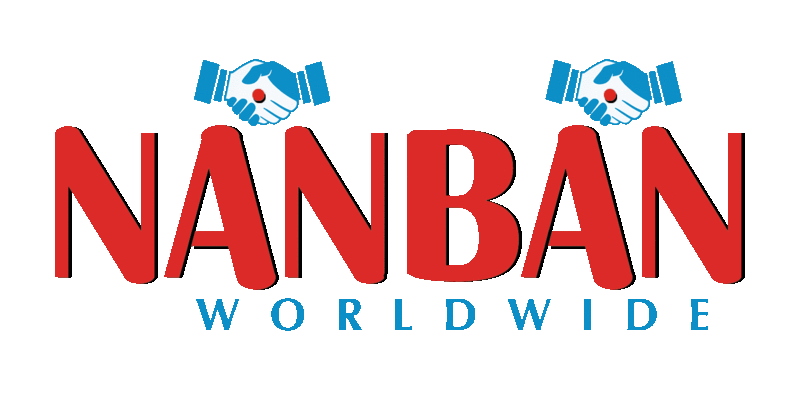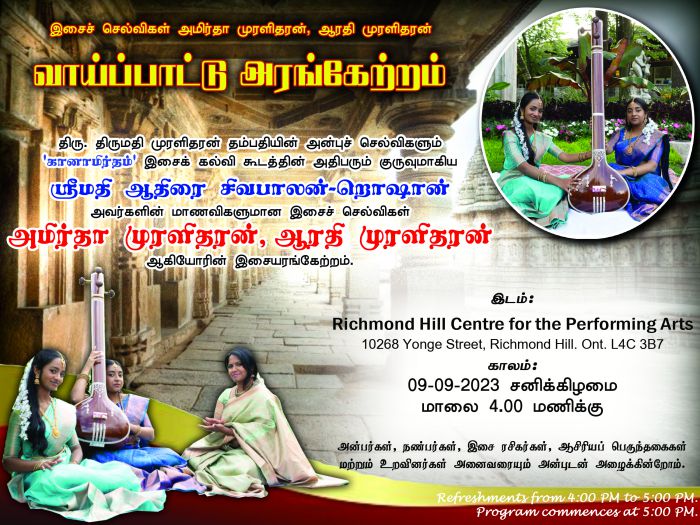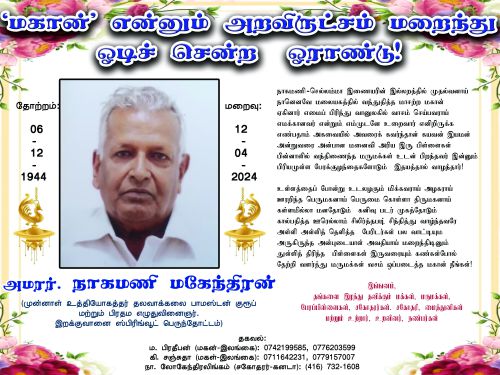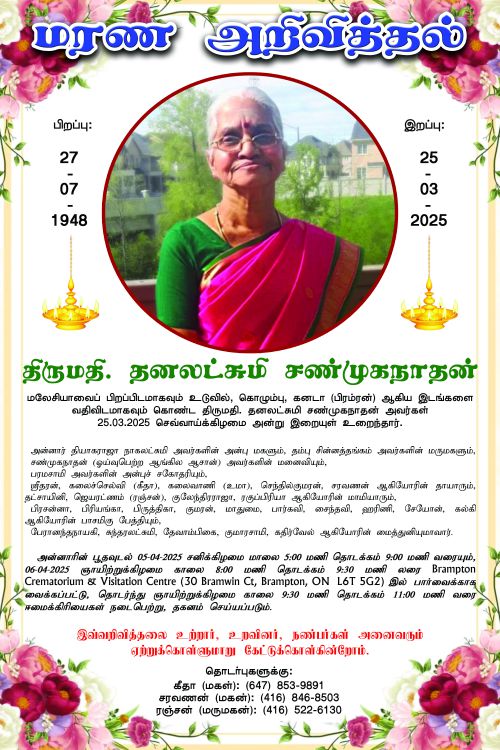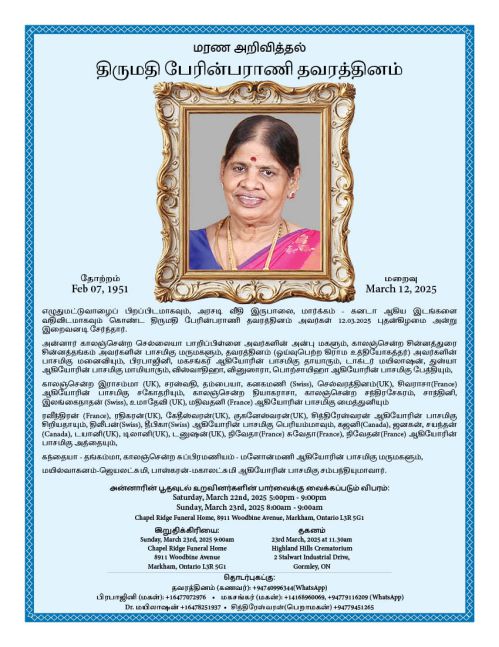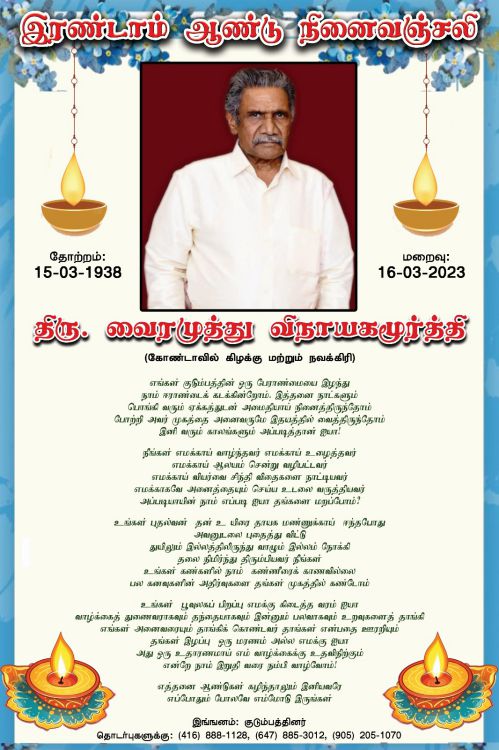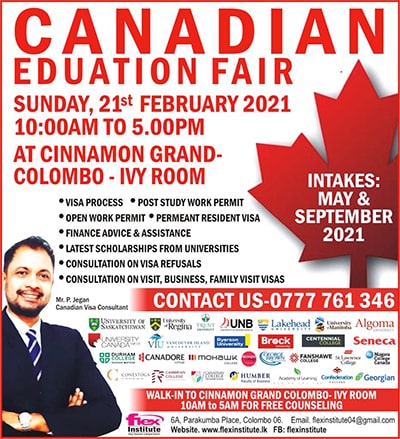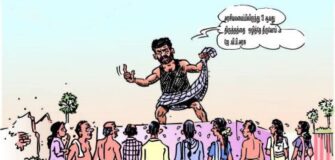கனடாவில் பழங்குடி மக்களுக்கு இழைக்கப்பட்ட கொடுமைகளுக்காக அமைச்சர் ஹரி ஆனந்தசங்கரி பொறுப்பற்றவராக இருந்தும், இன்று அமைச்சராக இருந்து எதிர்கால தீர்வுகளுக்கு பொறுப்புக் கூறுகிறார்.
Share

கனடாவின் தேசியப் பத்திரிகையான ‘ரொறன்ரோ ஸ்ரார்’ புகழாரம் சூட்டுகின்றது
Minister Gary Anandasangaree may not be responsible for the sins of Canada’s past. however, he is politically accountable for solutions of the future.
Toronto Star’s Political Columnist Martin Regg Cohn
“கனடாவில் பழங்குடி மக்களுக்கு கடநத காலங்களில் இழைக்கப்பட்ட கொடுமைகளுக்காக அமைச்சர் ஹரி ஆனந்தசங்கரி தனிப்பட்ட முறையில் பொறுப்புக் கூற வேண்டிய அவசியம் இல்லை அவ்வாறிருந்தும் , இன்று அமைச்சராக உள்ளதால் அந்த கொடுமைகளுக்கான எதிர்கால தீர்வுகளுக்கு பொறுப்புக் கூறுகிறார்”
இவ்வாறு கனடாவின் தேசிய ஆங்கிலப் பத்திரிகையான ‘ரொறன்ரோ ஸ்ரார்’ புகழாரம் சூட்டியுள்ளது.
சில நாட்களுக்கு முன்னர் வெளியான மேற்படி பத்திரிகையின் முக்கிய செய்தியாக இந்த விடயத்திற்கு முன்னுரிமை கொடுக்கப்பட்டு இந்த செய்தி பிரசுரமாகியுள்ளது.
மேற்படி கட்டுரை வடிவில் பிரசுமான செய்தியில் நமது கனடிய தமிழ் பேசும் பாராளுமன்ற உறுப்பினரும் கனடாவின் மத்திய அரசின் பழங்குடி மக்களின் விவகாரங்களுக்கான அமைச்சருமான ஹரி ஆனந்தசங்கரி அவர்களைப் பாராட்டும் வகையில் உள்ள மேற்படி செய்திக்கு பொறுப்பான Martin Regg Cohn என்னும் அரசியல் பத்தி எழுத்தாளர் தொடர்ந்து பின்வருமாறு பல அரசியல் விவகாரங்களை சுட்டிக்காட்டியுள்ளார் என்பது இங்கு குறிப்பிடத்தக்கது
நமது அமைச்சர் ஹரி ஆனந்தசங்கரி அவர்கள் முடிக்குரிய அமைச்சொன்றின் உருவகமாகத் தெரிகின்றார்..
அதாவது கனடாவின் முடிக்குரிய -பழங்குடி உறவுகள் அமைச்சர் ஹரி ஆனந்தசங்கரி கனடாவில் வெள்ளை காலனித்துவத்தின் சாத்தியமில்லாத முகம்-அல்லது குறைந்தபட்சம் அதன் வரலாற்று மரபு சார்ந்த ஒருவர்.
மற்ற எந்த கனடியனையும் போலவே, கனடாவின் கடந்த கால பாவங்களுக்கும் பழங்குடி மக்களுக்கு இழைக்கப்பட்ட கொடுமைகளுக்கும் அவர் தனிப்பட்ட முறையில் பொறுப்பேற்க மாட்டார். எவ்வாறாயினும், இன்று அமைச்சர் அரசியல் ரீதியாக எதிர்கால தீர்வுகளுக்கு பொறுப்புக் கூறுகிறார்.
இலங்கையிலிருந்து ஒரு தமிழராகக் கனடாவில் குடியேறியவர் – முடிக்குரிய பிரிட்டிஷ் காலனித்துவப்படுத்தப்பட்டவர் – அனைத்து கனேடியர்களையும் தொடும் காலனித்துவ வரலாற்றை அவர் குறிப்பாக அறிந்திருக்கிறார். ஒரு மனித உரிமை வழக்கறிஞராகவும், சமூக ஆர்வலராகவும் தனது கடந்த கால கனடிய வாழ்க்கையில், ஆனந்தசங்கரி ஒரு தசாப்தத்திற்கு முன்னர் அரசியலுக்குள் நுழைவதற்கு நீண்ட காலத்திற்கு முன்பே அதைப் பற்றி யோசித்துக்கொண்டிருந்தார்.இப்போது அந்த விவகாரங்களுக்கு பொறுப்பான அமைச்சராக பதவி வகிக்கின்றார்.
இந்த விடயம் தொடர்பாக அமைச்சர் ஹரி ஆனந்தசங்கரி அவர்கள் தொடர்ந்து கூறுகின்றார்.
“இந்த நாட்டில் இருந்து என்னால் பயனடைய முடிந்தது-இது ஒரு சிறந்த கல்வி முறையாக இருந்தாலும்… அது பொருளாதாரமாக இருந்தாலும், அது சுகாதாரப் பாதுகாப்புக்கான அணுகலா என்பதுதான்… அந்த விஷயங்கள் அனைத்தையும் இந்த காலனித்துவத்திலிருந்து நான் பயனடைகிறேன் என்ற ஆழமான புரிதலுக்கு வழிவகுத்தது செயல்முறை மற்றும் இந்த அமைப்பு, ”ரொறன்ரோவில் உள்ள ஒரு பல்கலைக்கழகத்தில் நான் நடத்தியதாக அமைச்சர் ஜனநாயக மன்றத்தில் தெரிவித்தார்.
ஆனந்தசங்கரி தானே கடந்த ஆண்டு அமைச்சராக பதவியேற்ற நாளிலிருந்து தொடர்ந்து மன்னிப்பு கோருகிறார். கடந்த கோடையில் அவர் நீண்டகால அநீதிகளுக்காக ஒன்பது டகோட்டா-லகோட்டா பழங்குடி சமூகங்களிடம் மன்னிப்பு கேட்டார். கடந்த மாதம் அவர் மனிற்றோலின் தீவில் பழங்குடி மக்களுக்கு கடந்த காலங்களில் நிதியை தவறாக நிர்வகித்ததற்காக மன்னிப்பு கேட்டார், அத்துடன் அரசாங்கம் முறையாக செயல்படத் தவறிவிட்டது” என்றும் முறையாக ஹரி ஆனந்தசங்கரி அறிவித்தார்.
கடந்த வார இறுதியில், எங்கள் நிகழ்வுக்குப் பிறகு, 1950 கள் மற்றும் 1960 களில் சமூகங்களை பேரழிவிற்கு உட்படுத்திய ஸ்லெட் நாய்களின் வெகுஜன படுகொலைக்காக நுனாவிக் நகரில் உள்ள இன்யூட் நிறுவனத்திற்கு வாக்குறுதியளிக்கப்பட்ட மன்னிப்பு கோரினார், இந்த இடத்தில்வைத்து அமைச்சர் அவர்களிடம் கூறியது:என்னவென்றால் “அரசாங்கத்தின் சார்பாக:“ அரசாங்கத்தின் சார்பாக கனடா மற்றும் அனைத்து கனடியர்களிடமும், நான் வருந்துகிறேன். தயவுசெய்து எங்களை மன்னியுங்கள். ” என்றார்
மன்னிப்பு ஏற்றுக்கொள்ளப்பட்டதா? வளிமண்டலம் சில நேரங்களில் கண்ணீருடன் இருக்கலாம், ஆனால் எப்போதும் உண்மையாக இருக்க வேண்டும்.
“அவை அர்த்தமுள்ளதாக இல்லாவிட்டால் மன்னிப்பு என்பது வெறுமையே ஆகும்… இறுதியில் இது பதிவை நேராக அமைப்பது” என்று அமைச்சர் என்னிடம் கூறினார். “இது இழப்பீட்டைப் பற்றியது அல்ல, உண்மையில் உண்மையைச் சொல்வது, உண்மையை ஒப்புக்கொள்வது பற்றியது.”
உண்மை என்னவென்றால், முன்னேற்றம் வலிமிகுந்த மெதுவாக உள்ளது. சில ஆண்டுகளுக்கு முன்பு ஒரு ஜனநாயக மன்றத்தில், சுதேச எம்.பி.
ஒரு வெளிநாட்டு நிருபராக, கனேடிய இராணுவத்தின் விரைவான பேரழிவு உதவி மறுமொழி குழுவினது தொண்டர்கள் 2005ம் ஆண்டு சுனாமி தாக்குதலுக்குப் பிறகு சுத்தமான தண்ணீரை வழங்குவதற்காக அவரது சொந்த இலங்கைக்கு அனுப்பப்பட்டதை நான் அமைச்சரிடம் விவரித்தேன், ஆனால் உள்நாட்டு ஒதுக்கீடு கனடா முழுவதும் இல்லாமல் இலங்கைக்கு செய்ய வேண்டியிருந்தது.
ஆனந்தசங்கரி இரட்டைத் தரத்தை ஒப்புக் கொண்டார், மீட்பு மற்றும் வெளியேறு, ஆனால் லிபரல் அரசியல்வாதிகள்ஒரு காலத்தில் நூற்றுக்கணக்கான கொதித்த நீர் ஆலோசனைகளை வியத்தகு முறையில் குறைப்பதற்கு முன்னுரிமை அளித்தது என்று வாதிட்டார். ஒன்ராறியோவில் இன்றும் 20 கொதிக்கும் நீர் ஆலோசனைகள் உள்ளன என்பதை அரசாங்கத்தின் எண்ணிக்கை காட்டுகிறது என்றும் அவர் சுட்டிக்காட்டினார்
அந்த பின்னணியில், பழங்குடி இளைஞர்களிடையே தற்கொலையின் ஒரு தொற்றுநோய் அதிகரித்து வருகிறது, கனேடியர்கள் மனநலம் பற்றி வெளிப்படையாக பேசுகிறார்கள் மற்றும் நாடு முழுவதும் இறப்பு விகிதங்களை வீழ்த்துகிறார்கள். அண்மையில் பொலிஸ் துப்பாக்கிச் சூட்டில் பழங்குடி மக்களின் மரணங்களை ஆனந்தசங்கரி எழுப்பினார், இது ஒப்பீட்டளவில் சிறிய ஊடகக் கவரேஜைப் பெற்றுள்ளது.
எதிர்கால பொருளாதார வாய்ப்பு பதிலின் ஒரு பகுதியாகும், ஆனால் அதுவும் குணப்படுத்துகிறது – மேலும் மொழி மற்றும் கலாச்சாரத்துடன் இணைப்பு உட்பட வரலாற்றின் கணக்கியல். 2015 ஆம் ஆண்டில் உண்மை மற்றும் நல்லிணக்க ஆணையத்தால் கட்டளையிடப்பட்டபடி, நாடு முழுவதும் உள்ள பாடத்திட்டங்களில் அதிகமான உள்நாட்டு உள்ளடக்கத்தை எவ்வாறு இணைப்பது என்று அவரிடம் கேட்ட மாணவர்களின் பார்வையாளர்களின் கேள்விகளில் அந்த கருப்பொருள்கள் அடிக்கடி வந்தன.
மந்தநிலை எப்போதும் அரசியல்வாதிகளுடன் ,இருந்ததில்லை; எதிர்ப்பு சில நேரங்களில் பொதுமக்களுடன் இருக்கும். அண்மையில் மாகாண தேர்தல் பிரச்சாரத்தில், பழங்குடி மக்களின் பிரச்சினைகள் குறித்து பல விலையுயர்ந்த சலுகைகளை வழங்குவதாக பிரிட்டிஷ் கொலம்பியாவின் என்டிபி அரசாங்கம் வழங்கிய உறுதி மொழிகள் பல வாக்காளர்களால் கவர்ந்துள்ளன என்றும் ஹரி ஆனந்தசங்கரி பகிர்ந்து கொண்டார்.
“அவர்கள் நல்லிணக்கத்திற்காக மலைகளை நகர்த்தியுள்ளனர், அவர்கள் அதிக முதலீடு செய்துள்ளனர் … முந்தைய மாகாண அரசாங்கத்தை விட மிகவும் வித்தியாசமான வழியில் நல்லிணக்கத்தைப் பார்க்கிறார்கள்,” என்று அவர் கூறினார். பிரிட்டிஸ் கொலம்பியாவின் அரசாங்கம் எதிர்ப்பை எதிர்கொண்டுள்ளனர் – ஒரு எதிர்வினை – வாக்காளர்களிடமிருந்து தோன்றியுள்ளது எனலாம் என்றார் ஹரி ஆனந்தசங்கரி
Minister Gary Anandasangaree is the Embodiment of the Crown.
Which means Crown-Indigenous Relations Minister Gary Anandasangaree is the unlikely face of white colonialism in Canada — or at least its historical legacy.
Like any other Canadian, he may not be personally responsible for the sins of Canada’s past. Today, however, the minister is politically accountable for solutions of the future.
As a Tamil immigrant from Sri Lanka — also colonized by the British crown — he is especially conscious of the colonial history that touches all Canadians. As a human rights lawyer and community activist in his previous life, Anandasangaree had been thinking about it since long before he entered politics a decade ago.
“What I have been able to benefit from in this country — whether it’s a top-notch education system … whether it’s economic, whether it’s access to health care … all of those things led me to a deeper understanding that I am benefiting from this colonial process and this system,” the minister told Friday’s Democracy Forum that I hosted at Toronto Metropolitan University.
“All Canadians, I think, need to come on board and understand that this is our collective journey.”
Anandasangaree himself has been on a journey of apology since becoming minister last year. Last summer he apologized to nine Dakota-Lakota First Nations communities for long-standing injustices. Last month he apologized to First Nations on Manitoulin Island for mismanagement of funds in the past, formally declaring, “The Crown failed to act honourably.”
This past weekend, shortly after our event, he flew to Northern Quebec to deliver a promised apology to the Inuit in Nunavik for the mass slaughter of sled dogs that devastated communities in the 1950s and 1960s, telling them: “On behalf of the government of Canada and of all the Canadians, I am sorry. Please forgive us.”
Are the apologies accepted? The atmosphere can sometimes be tearful, but must always be truthful.
“Apologies are hollow if they’re not meaningful … ultimately this is about setting the record straight,” the minister told me. “It’s not about compensation, it’s actually about telling the truth, acknowledging the truth.”
The reality is that progress has been painfully slow. At a Democracy Forum a few years ago, Indigenous MPP Sol Mamakwa sipped a glass of water onstage while explaining to our campus audience that he couldn’t safely do the same in his Northern Ontario riding of Kiiwetinoong because of boil water advisories on reserves.
I also recounted to the minister how as a foreign correspondent, I’d seen troops from the Canadian military’s rapid-response DART (Disaster Assistance Response Team) deployed to his native Sri Lanka to deliver clean water after the 2005 tsunami hit, while Indigenous reserves across Canada had to do without.
Anandasangaree acknowledged the double standard, on-reserve and off, but argued that the federal Liberals made it a priority to dramatically reduce boil water advisories that were once in the hundreds. A government tally shows there are still 20 boil water advisories in Ontario today.
Against that backdrop, an epidemic of suicide among Indigenous youth is increasing at the very time that Canadians are talking openly about mental health and driving death rates down across the country. Anandasangaree himself raised the deaths of Indigenous people in recent police shootings, noting it has received relatively little media coverage.
Future economic opportunity is part of the answer, but so too is healing — and an accounting of history, including attachment to language and culture. Those themes came up frequently in audience questions from students, who asked him how to incorporate more Indigenous content in curriculums across the country, as mandated by the Truth and Reconciliation Commission in 2015.
The inertia isn’t always with politicians; the resistance is sometimes with the public. Anandasangaree suggested that British Columbia’s NDP government may have been seen by some voters, in the recent provincial election campaign, as making too many costly concessions on Indigenous issues.
“They have moved mountains on reconciliation, they have invested heavily … they are looking at reconciliation in a very different way than any previous provincial government,” he mused. “They have encountered resistance — a reaction — from voters … there’s a gap.”
